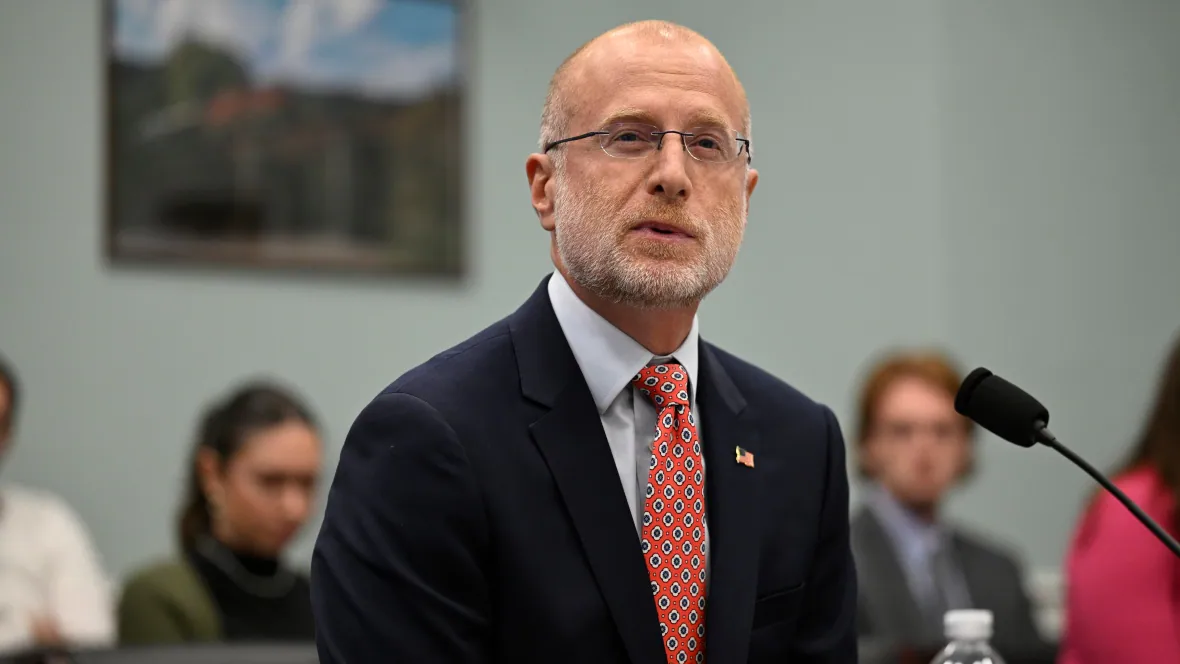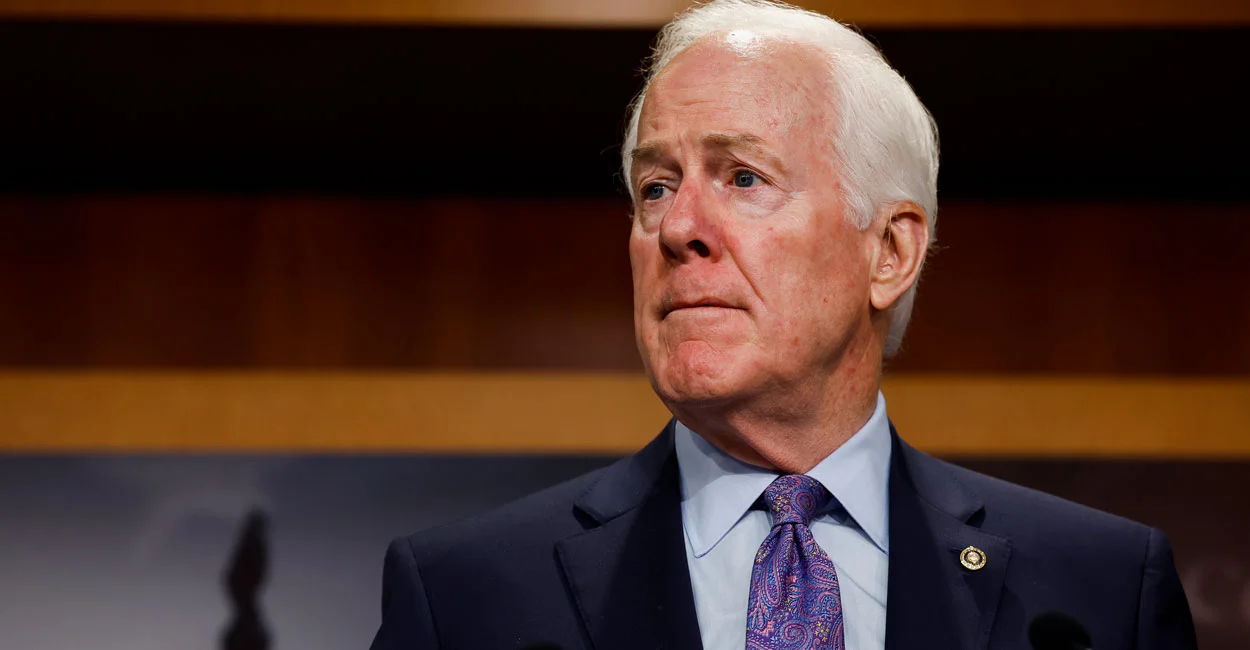By Chris Iorfida
Copyright cbc

Democratic House minority leader Hakeem Jeffries on Thursday called on U.S. Federal Communications Commission chair Brendan Carr to resign immediately, as fallout continued from the indefinite suspension of ABC late-night talk show host Jimmy Kimmel.
Jeffries said Carr — who President Donald Trump hailed as a “warrior for free speech” when nominating him as chair last year — had “disgraced the office he holds by bullying ABC.”
Carr, given past comments in the face of criticism, will likely laugh off the demand. But the statement by Jeffries reflects an unusually interventionist first year for Carr in a position that has rarely attracted attention, occasionally rising to public prominence during controversies, such as when the 2004 Super Bowl halftime show famously featured an unexpected nipple.
The indefinite suspension of Jimmy Kimmel Live! was announced late Wednesday after the comic made remarks Monday and Tuesday about the assassination of Charlie Kirk, including saying that “many in MAGA land are working very hard to capitalize on” the shooting and to characterize the suspected attacker “as anything other than one of them.”
On Thursday, Carr suggested in a CNBC interview that Kimmel was “appearing to directly mislead the American public about a significant fact.”
Before the suspension Wednesday Carr had urged local ABC affiliates to stop airing the show. He suggested the commission could open an investigation and that broadcasters could potentially be fined or lose their licences.
“This is a very, very serious issue right now for Disney [ABC’s corporate parent]. We can do this the easy way or the hard way,” Carr said in an interview with podcast host Benny Johnson. He also said local stations needed to “step up” to express dissent against what he variously called “this garbage” and “sickest conduct possible.”
Anna Gomez, who serves alongside Carr on the commission, appeared to take aim at the chair by posting on social media that, “an inexcusable act of political violence by one disturbed individual must never be exploited as justification for broader censorship and control.”
Gomez in recent months has undertaken a speaking tour to highlight what she feels is a real threat to free speech from the current administration.
In addition, three former FCC chairs serving under both Democratic and Republican administrations expressed concerns over politicization of the agency early under Carr’s watch, in comments to media columnist Oliver Darcy’s newsletter. Among the concerns were plans Carr announced to investigate the diversity practices of Disney, a move they believed was beyond his regulatory purview.
In response to the former chairs, Carr was reported to have said: “I feel bad for the three of them. I imagine it’s hard when the curtain is closing on your career and yet you’re still yearning for one more moment in the limelight.”
FCC should support ‘diversity of viewpoints’: Carr
The FCC was established in 1934 as part of the Communications Act, just a few years after the first versions of television sets began to be sold commercially. At least two senators accused President Franklin Roosevelt of trying to “censor the press” by broadening regulation that previously covered telecommunications and radio, according to New York Times reporting at the time.
A bipartisan five-person commission in recent years, the FCC’s remit also now includes broadband internet. News items in recent days show its wide-spanning purview: in one, a court recently upheld its $47-million fine against wireless carrier Verizon for illegally sharing customer location data; in another, Carr proposed ending subsidies for wireless use on school buses created under a COVID-era program, which he deemed as “illegal funding [of] unsupervised screen time for young kids.”
Its particular authority with television involves approving eight-year licences to individual broadcast stations across the country.
Carr clerked for a conservative federal judge and worked at a Washington, D.C., law firm before joining the FCC as part of its legal counsel in 2012. Trump in his first term nominated him to serve as one of the five commissioners.
In the months leading up to his nomination as chair, Carr had written a chapter about the FCC for Project 2025, the sweeping blueprint for a Trump second term by right-wing think-tank Heritage Foundation.
The chapter begins by Carr asserting that the FCC should, among other goals, “promote freedom of speech” and “enable the private sector to create good-paying jobs through pro-growth reforms that support a diversity of viewpoints.”
Mocked reaction to Colbert exit
Before ascending to chair, Carr also called for loosening rules that limit the number of radio and TV stations a company can own in a single market.
Jeffries in his statement said the censoring of Kimmel “may also be part of a corrupt pay-to-play scheme” that the Democrats will seek to investigate, though the Republicans are the majority in the House until at least 2027.
Jeffries did not elaborate, but it is known that Nexstar, owner of 32 ABC affiliates, is seeking to buy broadcaster Tegna in a $6.2-billion US deal that will require FCC approval.
Carr’s FCC in late July approved the merger of CBS parent Paramount to Skydance — founded by David Ellison, the son of longtime Trump supporter and Oracle co-founder Larry Ellison — a week after it was announced that Stephen Colbert’s late night show would end its run in May 2026. Paramount and CBS executives said the end of the show was “purely a financial decision.”
“The partisan left’s ritualist wailing and gnashing of teeth over Colbert is quite revealing,” Carr said after supporters of the host expressed dismay at the news.
“They’re acting like they’re losing a loyal [Democratic National Committee] spokesperson that was entitled to an exemption from the laws of economics,” he added.
Selective regulation?
Since the completion of the merger, CBS has announced the hiring of an ombudsman from a conservative think-tank, an idea Carr had floated publicly, as well as changes to news interview policies. Just days into Carr’s tenure as chair, the FCC released a transcript of a CBS interview in 2024 with Democratic candidate Kamala Harris that he had previously characterized as deceptively edited, a charge that commissioner Gomez rejected.
After the Paramount-Skydance merger was completed, the Freedom of the Press Foundation blasted the chief regulator.
“Carr — who intends to monitor bias while wearing the president’s bust as a lapel pin — is the poster child for why the Constitution bars the government from meddling in newsrooms’ editorial decisions,” the group, founded in 2012, said. Separately, the foundation had filed a legal ethics complaint in D.C. against Carr, alleging “egregious misconduct” and “frivolous and unconstitutional” actions on his part.
Longtime political pundit Al Hunt, in a column earlier this year, said that Carr had seemed like a “smart, traditional conservative” but had gone “full MAGA.”
Hunt highlighted that Carr’s general counsel downplayed the 2021 Capitol riot. He also wrote that, “the one major broadcasting outlet he has not criticized and is not investigating is the conservative cable news company, Fox News.”
In the wake of Kirk’s killing, that point has been picked up on by social media commentators. Carr does not appear to have commented on, much less condemned, Fox News host Jesse Watters issuing veiled threats to “the left” and calling to “avenge” Kirk’s death.
A few days later, Fox News host Brian Kilmeade called for involuntary lethal injection of some homeless individuals, or to “just kill ’em.” Kilmeade apologized, with no apparent censure from Fox News or comment from Carr.
“Silly Jimmy Kimmel. He should have just called for all homeless people to be killed and he’d still have a job,” Mehdi Hasan, founder of progressive site Zeteo, posted on social media on Wednesday night.
When the former FCC chairs balked at Carr’s plans to assail the diversity practices of private broadcasters, critics pointed out that Fox News — not mentioned in that context by Carr — also has programs promoting diversity.
Since the Kimmel suspension was announced, people including former Republican congressman Adam Kinzinger and Democratic Gov. J.B. Pritzker of Illinois have highlighted past Carr comments that appear to contrast his current stances.
Kinzinger highlighted a 2019 Carr tweet that read, “The FCC does not have a roving mandate to police speech in the name of ‘public interest.'”



